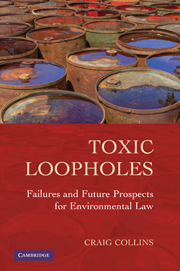Book contents
- Frontmatter
- Contents
- Dedication
- Introduction: Crime Without Punishment
- 1 The EPA – Policing or Protecting Polluters?
- 2 The Clean Air Act – Gasping for Breath
- 3 The Clean Water Act – Up Sh*t Creek
- 4 Superfund and RCRA – Toxic Trash
- 5 TSCA – The Toothless Tiger
- 6 The Endangered Species Act – Noah's Ark or Titanic?
- 7 Planetary Problems – Cooperation or Collapse?
- Conclusion: A Glimmer of Hope
- Bibliography
- Index
1 - The EPA – Policing or Protecting Polluters?
Published online by Cambridge University Press: 05 June 2012
- Frontmatter
- Contents
- Dedication
- Introduction: Crime Without Punishment
- 1 The EPA – Policing or Protecting Polluters?
- 2 The Clean Air Act – Gasping for Breath
- 3 The Clean Water Act – Up Sh*t Creek
- 4 Superfund and RCRA – Toxic Trash
- 5 TSCA – The Toothless Tiger
- 6 The Endangered Species Act – Noah's Ark or Titanic?
- 7 Planetary Problems – Cooperation or Collapse?
- Conclusion: A Glimmer of Hope
- Bibliography
- Index
Summary
Before 1970, America's few environmental laws were hardly worth the trees sacrificed to write them, and no single agency was charged with their enforcement. Over the ensuing decade, this situation changed. Congress passed 27 major environmental laws, and President Nixon created a single federal agency – the Environmental Protection Agency (EPA) – whose sole mission was environmental protection. This dramatic government action was a direct response to widespread public concern and unrelenting, intrepid grassroots activism.
Ignited by media coverage of several sensational environmental calamities and the obviously deteriorating condition of the country's land, air and water, public alarm was adeptly mobilized by a growing army of environmental activists schooled in the civil rights, women's liberation and anti-war movements. Groups such as Greenpeace, Friends of the Earth and the Sierra Club channeled public concern into a powerful ecology movement that compelled politicians to elevate environmental protection to a front-burner issue for the first time in American history.
The ecology movement insisted that the federal government must shoulder responsibility for defending the environment. Environmentalists argued that because pollution ignored state boundaries, and individual states lacked the resources and political will to confront powerful polluters, it was primarily Washington's job to police the polluters and set nationwide goals and standards for all states to follow. In addition, they believed that national standards would prevent a “race-to-the-bottom” between states hoping to attract business by offering the most lax environmental standards.
- Type
- Chapter
- Information
- Toxic LoopholesFailures and Future Prospects for Environmental Law, pp. 5 - 34Publisher: Cambridge University PressPrint publication year: 2010



